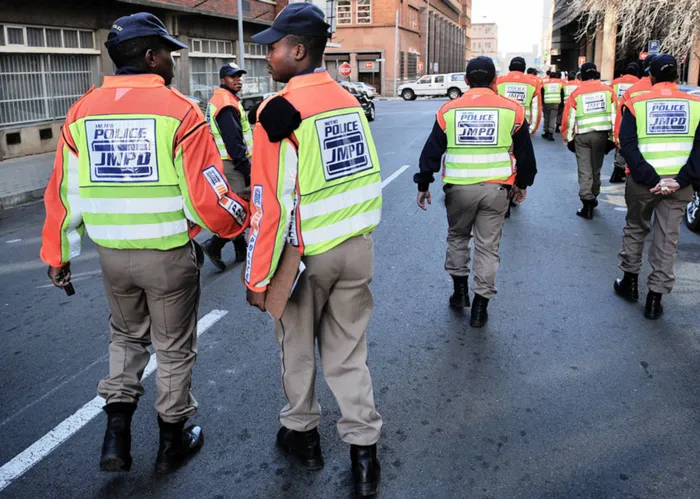
JMPD officials have been told they must generate R20 million in the new financial year, which means writing a minimum of 10 fines a day each in some areas. Photo: Cara Viereckl JMPD officials have been told they must generate R20 million in the new financial year, which means writing a minimum of 10 fines a day each in some areas. Photo: Cara Viereckl
Joburg traffic officers have been given targets of issuing 100 000 traffic fines a month.
And if they meet their targets, they will be allowed to work overtime over weekends and public holidays – when they can issue even more fines.
The Saturday Star has seen a memo circulated in one of the Johannesburg Metro Police Department’s seven regions, justifying the directive on the grounds that “JMPD must generate R20 million for the new financial year” as a result of which officers have to issue a set number of fines a day.
On Friday the JMPD defended the new strategy as a “management tool used to measure performance of its officers on the streets”.
Depending on the region in which officers work, some may feel obliged to issue a minimum of 10 fines a day – every day.
The move is expected to lead to a tsunami of prosecutions and allow the city to generate millions through fines.
Several JMPD officers, who wished not to be named, told the Saturday Star their regional commanders had told them of the new directive.
“Before there was no emphasis put on the number of tickets one must issue to motorists in a day,” said an officer. “This is a subversion of our mandate because we were told that the city is in budget constraints and therefore we need to raise revenue.”
Another officer said:
”We now have to go out of our way and find fault with motorists instead of enforcing by-laws. This is going to lead to the victimisation of drivers who will be punished for minor offences.”
JMPD spokeswoman Edna Mamonyane denied that officers who wrote more fines would “automatically get Sunday bonus” and said the targets were “reasonable”.
“On a daily basis every second vehicle is committing an offence. In Joburg I can pick 15 fines in the space of an hour. The reason why we end up with so many corrupt officers is because they are not writing fines. This is a way to curb that. There are officers who come to work and abuse JMPD vehicles going to shopping malls. It is a management tool. Why would we parade these people and not manage them to know where they are and what they are doing?”
She admitted that if officers “continually under-performed” by not meeting monthly fine targets, it could adversely affect their careers.
Jack Mokalapa of the SA Municipal Workers Union said officers were “extremely angry with the slave-like preconditions” for overtime work.
He said the move by JMPD was “immensely fruitless and illogical revenue generation”.
The decision received mixed responses from motoring organisations and drivers on Friday.
Rob Handfield-Jones, managing director of driving.co.za, said if the focus of the targets was road safety and not making money he would fully support it.
“I am in favour of performance quotas if they are linked to the most dangerous offences on the road,” he said. “It depends on how these targets are going to be used… I suppose it is possible that it could lead to prosecution of petty offences to fill in the quota books.”
Their job was to make the roads safer and reduce the number of road traffic casualties.
Howard Dembovsky, chairman of motoring lobby group Justice Project SA, said physical enforcement was encouraging provided it was done correctly.
“There is no shortage of people in Joburg who are not wearing their seatbelts and those jumping red traffic lights. You cannot assure public safety if you are just standing around doing nothing,” he said.
A Soweto motorist who identified himself as Charles said: “Officers will go flat-out to achieve their target. They’ll ticket the easy ones and miss the really dangerous drivers.”
Another, Ray Morar, said he felt targets would deal with reckless driving but also feared “innocent drivers” would be picked on unnecessarily.
Andrew Faull, senior researcher in the Crime and Justice Programme at the Institute for Security Studies, said targets could be good but sucessful policing could never be measured on “the frequency of people being punished”.
l The JMPD could be heavily affected by the national Samwu strike scheduled to begin on Monday. - Saturday Star
